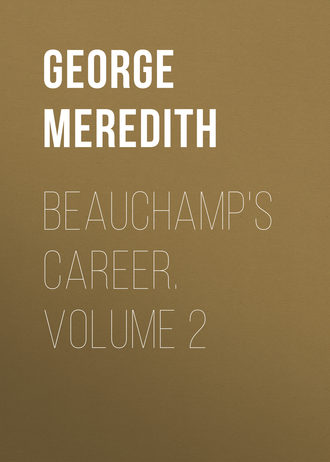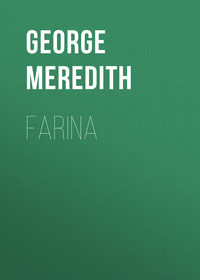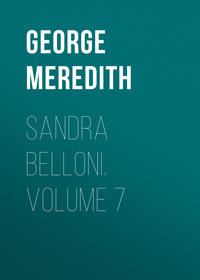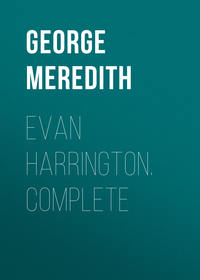
Beauchamp's Career. Volume 2
But for an occasional drop and bump of the sailing gasbag upon catch- words of enthusiasm, which are the rhetoric of the merely windy, and a collapse on a poetic line, which too often signalizes the rhetorician's emptiness of his wind, the article was eminent for flight, sweep, and dash, and sailed along far more grandly than ordinary provincial organs for the promoting or seconding of public opinion, that are as little to be compared with the mighty metropolitan as are the fife and bugle boys practising on their instruments round melancholy outskirts of garrison towns with the regimental marching full band under the presidency of its drum-major. No signature to the article was needed for Bevisham to know who had returned to the town to pen it. Those long-stretching sentences, comparable to the very ship Leviathan, spanning two Atlantic billows, appertained to none but the renowned Mr. Timothy Turbot, of the Corn Law campaigns, Reform agitations, and all manifestly popular movements requiring the heaven-endowed man of speech, an interpreter of multitudes, and a prompter. Like most men who have little to say, he was an orator in print, but that was a poor medium for him—his body without his fire. Mr. Timothy's place was the platform. A wise discernment, or else a lucky accident (for he came hurriedly from the soil of his native isle, needing occupation), set him on that side in politics which happened to be making an established current and strong headway. Oratory will not work against the stream, or on languid tides. Driblets of movements that allowed the world to doubt whether they were so much movements as illusions of the optics, did not suit his genius. Thus he was a Liberal, no Radical, fountain. Liberalism had the attraction for the orator of being the active force in politics, between two passive opposing bodies, the aspect of either of which it can assume for a menace to the other, Toryish as against Radicals; a trifle red in the eyes of the Tory. It can seem to lean back on the Past; it can seem to be amorous of the Future. It is actually the thing of the Present and its urgencies, therefore popular, pouring forth the pure waters of moderation, strong in their copiousness. Delicious and rapturous effects are to be produced in the flood of a Liberal oration by a chance infusion of the fierier spirit, a flavour of Radicalism. That is the thing to set an audience bounding and quirking. Whereas if you commence by tilling a Triton pitcher full of the neat liquor upon them, 'you have to resort to the natural element for the orator's art of variation, you are diluted—and that's bathos, to quote Mr. Timothy. It was a fine piece of discernment in him. Let Liberalism be your feast, Radicalism your spice. And now and then, off and on, for a change, for diversion, for a new emotion, just for half an hour or so-now and then the Sunday coat of Toryism will give you an air. You have only to complain of the fit, to release your shoulders in a trice. Mr. Timothy felt for his art as poets do for theirs, and considered what was best adapted to speaking, purely to speaking. Upon no creature did he look with such contempt as upon Dr. Shrapnel, whose loose disjunct audiences he was conscious he could, giving the doctor any start he liked, whirl away from him and have compact, enchained, at his first flourish; yea, though they were composed of 'the poor man,' with a stomach for the political distillery fit to drain relishingly every private bogside or mountain-side tap in old Ireland in its best days—the illicit, you understand.
Further, to quote Mr. Timothy's points of view, the Radical orator has but two notes, and one is the drawling pathetic, and the other is the ultra-furious; and the effect of the former we liken to the English working man's wife's hob-set queasy brew of well-meant villany, that she calls by the innocent name of tea; and the latter is to be blown, asks to be blown, and never should be blown without at least seeming to be blown, with an accompaniment of a house on fire. Sir, we must adapt ourselves to our times. Perhaps a spark or two does lurk about our house, but we have vigilant watchmen in plenty, and the house has been pretty fairly insured. Shrieking in it is an annoyance to the inmates, nonsensical; weeping is a sickly business. The times are against Radicalism to the full as much as great oratory is opposed to extremes. These drag the orator too near to the matter. So it is that one Radical speech is amazingly like another—they all have the earth-spots. They smell, too; they smell of brimstone. Soaring is impossible among that faction; but this they can do, they can furnish the Tory his opportunity to soar. When hear you a thrilling Tory speech that carries the country with it, save when the incendiary Radical has shrieked? If there was envy in the soul of Timothy, it was addressed to the fine occasions offered to the Tory speaker for vindicating our ancient principles and our sacred homes. He admired the tone to be assumed for that purpose: it was a good note. Then could the Tory, delivering at the right season the Shakesperian 'This England . . .' and Byronic—'The inviolate Island . . .' shake the frame, as though smiting it with the tail of the gymnotus electricus. Ah, and then could he thump out his Horace, the Tory's mentor and his cordial, with other great ancient comic and satiric poets, his old Port of the classical cellarage, reflecting veneration upon him who did but name them to an audience of good dispositions. The Tory possessed also an innate inimitably easy style of humour, that had the long reach, the jolly lordly indifference, the comfortable masterfulness, of the whip of a four-in-hand driver, capable of flicking and stinging, and of being ironically caressing. Timothy appreciated it, for he had winced under it. No professor of Liberalism could venture on it, unless it were in the remote district of a back parlour, in the society of a cherishing friend or two, and with a slice of lemon requiring to be refloated in the glass.
But gifts of this description were of a minor order. Liberalism gave the heading cry, devoid of which parties are dogs without a scent, orators mere pump-handles. The Tory's cry was but a whistle to his pack, the Radical howled to the moon like any chained hound. And no wonder, for these parties had no established current, they were as hard-bound waters; the Radical being dyked and dammed most soundly, the Tory resembling a placid lake of the plains, fed by springs and no confluents. For such good reasons, Mr. Timothy rejoiced in the happy circumstances which had expelled him from the shores of his native isle to find a refuge and a vocation in Manchester at a period when an orator happened to be in request because dozens were wanted. That centre of convulsions and source of streams possessed the statistical orator, the reasoning orator, and the inspired; with others of quality; and yet it had need of an ever- ready spontaneous imperturbable speaker, whose bubbling generalizations and ability to beat the drum humorous could swing halls of meeting from the grasp of an enemy, and then ascend on incalescent adjectives to the popular idea of the sublime. He was the artistic orator of Corn Law Repeal—the Manchester flood, before which time Whigs were, since which they have walked like spectral antediluvians, or floated as dead canine bodies that are sucked away on the ebb of tides and flung back on the flow, ignorant whether they be progressive or retrograde. Timothy Turbot assisted in that vast effort. It should have elevated him beyond the editorship of a country newspaper. Why it did not do so his antagonists pretended to know, and his friends would smile to hear. The report was that he worshipped the nymph Whisky.
Timothy's article had plucked Beauchamp out of bed; Beauchamp's card in return did the same for him.
'Commander Beauchamp? I am heartily glad to make your acquaintance, sir; I've been absent, at work, on the big business we have in common, I rejoice to say, and am behind my fellow townsmen in this pleasure and lucky I slept here in my room above, where I don't often sleep, for the row of the machinery—it 's like a steamer that won't go, though it's always starting ye,' Mr. Timothy said in a single breath, upon entering the back office of the Gazette, like unto those accomplished violinists who can hold on the bow to finger an incredible number of notes, and may be imaged as representing slow paternal Time, that rolls his capering dot-headed generation of mortals over the wheel, hundreds to the minute. 'You'll excuse my not shaving, sir, to come down to your summons without an extra touch to the neck-band.'
Beauchamp beheld a middle-sized round man, with loose lips and pendant indigo jowl, whose eyes twinkled watery, like pebbles under the shore- wash, and whose neck-band needed an extra touch from fingers other than his own.
'I am sorry to have disturbed you so early,' he replied.
'Not a bit, Commander Beauchamp, not a bit, sir. Early or late, and ay ready—with the Napiers; I'll wash, I'll wash.'
'I came to speak to you of this article of yours on me. They tell me in the office that you are the writer. Pray don't "Commander" me so much. —It's not customary, and I object to it.'
'Certainly, certainly,' Timothy acquiesced.
'And for the future, Mr. Turbot, please to be good enough not to allude in print to any of my performances here and there. Your intentions are complimentary, but it happens that I don't like a public patting on the back.'
'No, and that's true,' said Timothy.
His appreciative and sympathetic agreement with these sharp strictures on the article brought Beauchamp to a stop.
Timothy waited for him; then, smoothing his prickly cheek, remarked: 'If I'd guessed your errand, Commander Beauchamp, I'd have called in the barber before I came down, just to make myself decent for a 'first introduction.'
Beauchamp was not insensible to the slyness of the poke at him. 'You see, I come to the borough unknown to it, and as quietly as possible, and I want to be taken as a politician,' he continued, for the sake of showing that he had sufficient to say to account for his hasty and peremptory summons of the writer of that article to his presence. 'It's excessively disagreeable to have one's family lugged into notice in a newspaper—especially if they are of different politics. I feel it.'
All would, sir,' said Timothy.
'Then why the deuce did you do it?'
Timothy drew a lading of air into his lungs. 'Politics, Commander Beauchamp, involves the doing of lots of disagreeable things to ourselves and our relations; it 's positive. I'm a soldier of the Great Campaign: and who knows it better than I, sir? It's climbing the greasy pole for the leg o' mutton, that makes the mother's heart ache for the jacket and the nether garments she mended neatly, if she didn't make them. Mutton or no mutton, there's grease for certain! Since it's sure we can't be disconnected from the family, the trick is to turn the misfortune to a profit; and allow me the observation, that an old family, sir, and a high and titled family, is not to be despised for a background of a portrait in naval uniform, with medal and clasps, and some small smoke of powder clearing off over there:—that's if we're to act sagaciously in introducing an unknown candidate to a borough that has a sneaking liking for the kind of person, more honour to it. I'm a political veteran, sir; I speak from experience. We must employ our weapons, every one of them, and all off the grindstone.'
'Very well,' said Beauchamp. 'Now understand; you are not in future to employ the weapons, as you call them, that I have objected to.'
Timothy gaped slightly.
'Whatever you will, but no puffery,' Beauchamp added. 'Can I by any means arrest—purchase—is it possible, tell me, to lay an embargo—stop to-day's issue of the Gazette?'
'No more—than the bite of a mad dog,' Timothy replied, before he had considered upon the monstrous nature of the proposal.
Beauchamp humphed, and tossed his head. The simile of the dog struck him with intense effect.
'There'd be a second edition,' said Timothy, 'and you might buy up that. But there'll be a third, and you may buy up that; but there'll be a fourth and a fifth, and so on ad infinitum, with the advertisement of the sale of the foregoing creating a demand like a rageing thirst in a shipwreck, in Bligh's boat, in the tropics. I'm afraid, Com—Captain Beauchamp, sir, there's no stopping the Press while the people have an appetite for it—and a Company's at the back of it.'
'Pooh, don't talk to me in that way; all I complain of is the figure you have made of me,' said Beauchamp, fetching him smartly out of his nonsense; 'and all I ask of you is not to be at it again. Who would suppose from reading an article like that, that I am a candidate with a single political idea!'
'An article like that,' said Timothy, winking, and a little surer of his man now that he suggested his possession of ideas, 'an article like that is the best cloak you can put on a candidate with too many of 'em, Captain Beauchamp. I'll tell you, sir; I came, I heard of your candidature, I had your sketch, the pattern of ye, before me, and I was told that Dr. Shrapnel fathered you politically. There was my brief! I had to persuade our constituents that you, Commander Beauchamp of the Royal Navy, and the great family of the Earls of Romfrey, one of the heroes of the war, and the recipient of a Royal Humane Society's medal for saving life in Bevisham waters, were something more than the Radical doctor's political son; and, sir, it was to this end, aim, and object, that I wrote the article I am not ashamed to avow as mine, and I do so, sir, because of the solitary merit it has of serving your political interests as the liberal candidate for Bevisham by counteracting the unpopularity of Dr. Shrapnel's name, on the one part, and of reviving the credit due to your valour and high bearing on the field of battle in defence of your country, on the other, so that Bevisham may apprehend, in spite of party distinctions, that it has the option, and had better seize upon the honour, of making a M.P. of a hero.'
Beauchamp interposed hastily: 'Thank you, thank you for the best of intentions. But let me tell you I am prepared to stand or fall with Dr. Shrapnel, and be hanged to all that humbug.'
Timothy rubbed his hands with an abstracted air of washing. 'Well, commander, well, sir, they say a candidate's to be humoured in his infancy, for he has to do all the humouring before he's many weeks old at it; only there's the fact!—he soon finds out he has to pay for his first fling, like the son of a family sowing his oats to reap his Jews. Credit me, sir, I thought it prudent to counteract a bit of an apothecary's shop odour in the junior Liberal candidate's address. I found the town sniffing, they scented Shrapnel in the composition.'
'Every line of it was mine,' said Beauchamp.
'Of course it was, and the address was admirably worded, sir, I make bold to say it to your face; but most indubitably it threatened powerful drugs for weak stomachs, and it blew cold on votes, which are sensitive plants like nothing else in botany.'
'If they are only to be got by abandoning principles, and by anything but honesty in stating them, they may go,' said Beauchamp.
'I repeat, my dear sir, I repeat, the infant candidate delights in his honesty, like the babe in its nakedness, the beautiful virgin in her innocence. So he does; but he discovers it's time for him to wear clothes in a contested election. And what's that but to preserve the outlines pretty correctly, whilst he doesn't shock and horrify the optics? A dash of conventionalism makes the whole civilized world kin, ye know. That's the truth. You must appear to be one of them, for them to choose you. After all, there's no harm in a dyer's hand; and, sir, a candidate looking at his own, when he has won the Election . . .'
'Ah, well,' said Beauchamp, swinging on his heel, 'and now I'll take my leave of you, and I apologize for bringing you down here so early. Please attend to what I have said; it's peremptory. You will give me great pleasure by dining with me to-night, at the hotel opposite. Will you? I don't know what kind of wine I shall be able to offer you. Perhaps you know the cellar, and may help me in that.'
Timothy grasped his hand, 'With pleasure, Commander Beauchamp. They have a bucellas over there that 's old, and a tolerable claret, and a Port to be inquired for under the breath, in a mysteriously intimate tone of voice, as one says, "I know of your treasure, and the corner under ground where it lies." Avoid the champagne: 'tis the banqueting wine. Ditto the sherry. One can drink them, one can drink them.'
'At a quarter to eight this evening, then,' said Nevil.
'I'll be there at the stroke of the clock, sure as the date of a bill,' said Timothy.
And it's early to guess whether you'll catch Bevisham or you won't, he reflected, as he gazed at the young gentleman crossing the road; but female Bevisham's with you, if that counts for much. Timothy confessed, that without the employment of any weapon save arrogance and a look of candour, the commander had gone some way toward catching the feminine side of himself.
CHAPTER XV
CECILIA HALKETT
Beauchamp walked down to the pier, where he took a boat for H.M.S. Isis, to see Jack Wilmore, whom he had not met since his return from his last cruise, and first he tried the efficacy of a dive in salt water, as a specific for irritation. It gave the edge to a fine appetite that he continued to satisfy while Wilmore talked of those famous dogs to which the navy has ever been going.
'We want another panic, Beauchamp,' said Lieutenant Wilmore. 'No one knows better than you what a naval man has to complain of, so I hope you'll get your Election, if only that we may reckon on a good look-out for the interests of the service. A regular Board with a permanent Lord High Admiral, and a regular vote of money to keep it up to the mark. Stick to that. Hardist has a vote in Bevisham. I think I can get one or two more. Why aren't you a Tory? No Whigs nor Liberals look after us half so well as the Tories. It's enough to break a man's heart to see the troops of dockyard workmen marching out as soon as ever a Liberal Government marches in. Then it's one of our infernal panics again, and patch here, patch there; every inch of it make-believe! I'll prove to you from examples that the humbug of Government causes exactly the same humbugging workmanship. It seems as if it were a game of "rascals all." Let them sink us! but, by heaven! one can't help feeling for the country. And I do say it's the doing of those Liberals. Skilled workmen, mind you, not to be netted again so easily. America reaps the benefit of our folly . . . . That was a lucky run of yours up the Niger; the admiral was friendly, but you deserved your luck. For God's sake, don't forget the state of our service when you're one of our cherubs up aloft, Beauchamp. This I'll say, I've never heard a man talk about it as you used to in old midshipmite days, whole watches through—don't you remember? on the North American station, and in the Black Sea, and the Mediterranean. And that girl at Malta! I wonder what has become of her? What a beauty she was! I dare say she wasn't so fine a girl as the Armenian you unearthed on the Bosphorus, but she had something about her a fellow can't forget. That was a lovely creature coming down the hills over Granada on her mule. Ay, we've seen handsome women, Nevil Beauchamp. But you always were lucky, invariably, and I should bet on you for the Election.'
'Canvass for me, Jack,' said Beauchamp, smiling at his friend's unconscious double-skeining of subjects. 'If I turn out as good a politician as you are a seaman, I shall do. Pounce on Hardist's vote without losing a day. I would go to him, but I've missed the Halketts twice. They 're on the Otley river, at a place called Mount Laurels, and I particularly want to see the colonel. Can you give me a boat there, and come?'
'Certainly,' said Wilmore. 'I've danced there with the lady, the handsomest girl, English style, of her time. And come, come, our English style's the best. It wears best, it looks best. Foreign women . . . they're capital to flirt with. But a girl like Cecilia Halkett—one can't call her a girl, and it won't do to say Goddess, and queen and charmer are out of the question, though she's both, and angel into the bargain; but, by George! what a woman to call wife, you say; and a man attached to a woman like that never can let himself look small. No such luck for me; only I swear if I stood between a good and a bad action, the thought of that girl would keep me straight, and I've only danced with her once!'
Not long after sketching this rough presentation of the lady, with a masculine hand, Wilmore was able to point to her in person on the deck of her father's yacht, the Esperanza, standing out of Otley river. There was a gallant splendour in the vessel that threw a touch of glory on its mistress in the minds of the two young naval officers, as they pulled for her in the ship's gig.
Wilmore sang out, 'Give way, men!'
The sailors bent to their oars, and presently the schooner's head was put to the wind.
'She sees we're giving chase,' Wilmore said. 'She can't be expecting me, so it must be you. No, the colonel doesn't race her. They've only been back from Italy six months: I mean the schooner. I remember she talked of you when I had her for a partner. Yes, now I mean Miss Halkett. Blest if I think she talked of anything else. She sees us. I'll tell you what she likes: she likes yachting, she likes Italy, she likes painting, likes things old English, awfully fond of heroes. I told her a tale of one of our men saving life. "Oh!" said she, "didn't your friend Nevil Beauchamp save a man from drowning, off the guardship, in exactly the same place?" And next day she sent me a cheque for three pounds for the fellow. Steady, men! I keep her letter.'
The boat went smoothly alongside the schooner. Miss Halkett had come to the side. The oars swung fore and aft, and Beauchamp sprang on deck.
Wilmore had to decline Miss Halkett's invitation to him as well as his friend, and returned in his boat. He left the pair with a ruffling breeze, and a sky all sail, prepared, it seemed to him, to enjoy the most delicious you-and-I on salt water that a sailor could dream of; and placidly envying, devoid of jealousy, there was just enough of fancy quickened in Lieutenant Wilmore to give him pictures of them without disturbance of his feelings—one of the conditions of the singular visitation we call happiness, if he could have known it.
For a time his visionary eye followed them pretty correctly. So long since they had parted last! such changes in the interval! and great animation in Beauchamp's gaze, and a blush on Miss Halkett's cheeks.
She said once, 'Captain Beauchamp.' He retorted with a solemn formality.
They smiled, and immediately took footing on their previous intimacy.
'How good it was of you to come twice to Mount Laurels,' said she. 'I have not missed you to-day. No address was on your card. Where are you staying in the neighbourhood? At Mr. Lespel's?'
'I'm staying at a Bevisham hotel,' said Beauchamp.
'You have not been to Steynham yet? Papa comes home from Steynham to- night.'
'Does he? Well, the Ariadne is only just paid off, and I can't well go to Steynham yet. I—' Beauchamp was astonished at the hesitation he found in himself to name it: 'I have business in Bevisham.'
'Naval business?' she remarked.
'No,' said he.
The sensitive prescience we have of a critical distaste of our proceedings is, the world is aware, keener than our intuition of contrary opinions; and for the sake of preserving the sweet outward forms of friendliness, Beauchamp was anxious not to speak of the business in Bevisham just then, but she looked and he had hesitated, so he said flatly, 'I am one of the candidates for the borough.'
'Indeed!'
'And I want the colonel to give me his vote.'
The young lady breathed a melodious 'Oh!' not condemnatory or reproachful—a sound to fill a pause. But she was beginning to reflect.
'Italy and our English Channel are my two Poles,' she said. 'I am constantly swaying between them. I have told papa we will not lay up the yacht while the weather holds fair. Except for the absence of deep colour and bright colour, what can be more beautiful than these green waves and that dark forest's edge, and the garden of an island! The yachting-water here is an unrivalled lake; and if I miss colour, which I love, I remind myself that we have temperate air here, not a sun that fiends you under cover. We can have our fruits too, you see.' One of the yachtsmen was handing her a basket of hot-house grapes, reclining beside crisp home-made loaflets. 'This is my luncheon. Will you share it, Nevil?'









